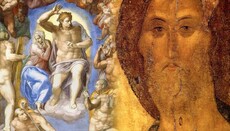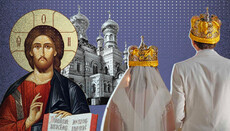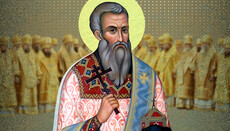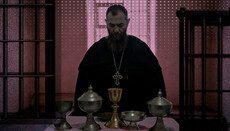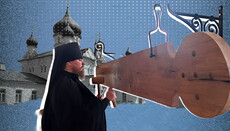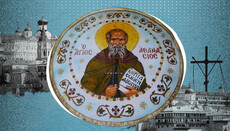“Picasso”: The Everyday Life of a Seminary in the Early 1990s
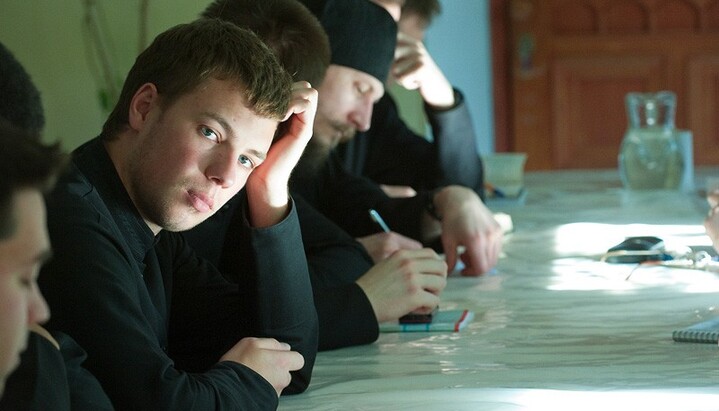
Excerpts from Andrey Vlasov’s book “Picasso. Part One: The Slave.” Episode 16.
Time: 1992
Place: Kyiv
Characters: seminarians and teachers
Within a few weeks, the first-year students had settled into seminary life. They got used to the routine and felt both the burdens and the blessings of bursary living.
The seminary day began around seven or half past seven in the morning. The brothers woke up and put themselves in order. Some did intense half-hour workouts, some prayed before their icons, and some lay in bed waiting their turn for the bathroom. By eight o’clock everyone had to be in the refectory, where morning prayers were read before breakfast. Someone from the “supervisors” was always present – the duty teacher, the assistant inspector, or occasionally the inspector himself. Breakfast consisted of simple porridge, bread (with butter on non-fasting days), and tea. Occasionally an egg was served. After breakfast, at half past eight, everyone went to class. Some students managed to run back to the dormitory to change clothes or drink their own tea – since the seminary tea “wasn’t the same.”
Then came two lessons and a short break: tea, bread, sometimes jam. After two more lessons, there was lunch – usually soup, bread, porridge, and compote with a bun. Sometimes meat or fish cutlets were served, depending on the fasting period.
After lunch came a short rest and “self-preparation” in the library. Attendance was mandatory. Seminarians were expected to reread notes, study books available there, and prepare for classes. One of the teachers was supposed to be present so that students could ask questions. In reality, the teachers rarely took this duty seriously, and left unsupervised, the bursary students behaved like typical college boys – talking loudly, laughing, telling stories, or throwing paper balls.
Not everyone behaved this way. Most tried to focus on their books and notes. But the active minority was so noisy that it was hard to concentrate. Studying in the dormitory was even harder – there, noise wasn’t even formally forbidden (within limits, of course). In the evenings, everyone gathered there, and the scene was quite colorful: some reading, others studying, drinking tea, eating canned food, chatting, walking around, listening to the radio, or strumming the guitar. Someone was writing a letter home, washing or ironing clothes.
There were also those who prayed. Amidst all this noise, they would stand in a corner before their icons or simply by their beds, reading prayers from memory or from a prayer book, sometimes fingering a rosary.
To focus on prayer in such conditions was a real act of asceticism – not like in some distant hermitage.
As the rector had said, the true consolation of seminary life was visiting the Caves and attending services at the monastery. Most seminarians went several times a week, sometimes daily, to the Near and Far Caves to venerate the saints. Many attended weekday services at the Lavra churches – mostly Vespers, since morning services coincided with lessons. Some, however, rose early enough to attend the Liturgy in one of the cave churches at half past five in the morning.
The seminary day ended with compulsory evening prayers in the seminary church near the Far Caves. Attendance was checked most strictly. Then came lights out.
As for obediences, there were not just many – there were very many: duties in the seminary and the metropolitan offices, kitchen, refectory, dormitories, and so on. The most common was cleaning the grounds, humorously called “PHD” (park–household duties) by the inspector. Everything was set aside for obediences – lessons, preparation, and all else. Seminarians were assigned permanent duties in rotation: sitting at the desk (serving as building monitor), setting and clearing the tables in the refectory, washing dishes. The last duty was nicknamed “the disco” because of the clatter of aluminum dishes – the seminarians banged them intentionally, especially when a superior was nearby.
Those who received “extra duty” were called “zaletchiki” (offenders). Such penalties were given for minor offenses that did not merit a formal reprimand. For example, the inspector might walk into the dormitory while morning prayers were already being read in the refectory and find a sleepy student still in bed.
“Get up!” the inspector would shout.
The poor offender would jump out of bed in his underwear, bow deeply, mumbling:
“Forgive me, bless me…”
And he would be assigned his punishment.
Blessing him, Father Viktor would deliver a painful tap on the bowed head with two fingers – a sting that lingered long after, reminding the student never to break discipline again.
Rumor had it that before becoming a seminary teacher, Father Viktor had been a prison warden. Indirectly, this was confirmed by his occasional use of words like “bunk,” “latrine,” or “to frisk,” and by his habit of spinning a bunch of keys on a chain. Because of this, and because he walked quickly, skipping three steps at a time, he was nicknamed “The Helicopter.” No one dared to ask him directly about his past – and he probably wouldn’t have answered anyway.
Every teacher in the seminary was, as they say, a personality – and one could tell stories about each of them endlessly. Most were clergymen, about a third were monks, and several were laymen. The latter came to class in suits and were called “the jacketed ones.”
Although every teacher knew his subject quite well, most of their lessons were dreadfully dull. “Scholasticism” – as someone accurately described it on the first day. Definitions, quotations, dates, names… rote memorization and almost no understanding of how it applied to real life. The most tedious subject was liturgics: the teacher explained everything so dryly and mechanically that it was enough to drive one mad. Particularly oppressive was the demand to memorize how many days of forefeast and afterfeast each church holiday had. “Why memorize,” students wondered, “if you can always look it up in the calendar – and when would you even need it?”
But there were also teachers the seminarians never wanted to leave, so engaging were their lessons. Sometimes even after the bell rang for the next class, they stayed, listening. The same “Helicopter,” Father Inspector, taught “Sect Studies” with great skill, neatly classifying every sectarian error and illustrating each with real-life examples.
But the most captivating lecturer of all was Father Lavr. Perhaps the plainness of his appearance and manner was balanced by his deep love for Scripture and his gift for speaking about it. He spoke calmly and evenly, never raising his voice or gesturing. The way he spoke was not memorable – but what he said was. The only quirk in his speech was his frequent, misplaced use of the word “again,” for which he earned the nickname “Again.” But more often, he was simply called by name – Father Lavr. Sometimes the students joked: “Lavr in the Lavra,” since he lived in the monastery.
* * *
After the first “Sacred History” lesson, everyone eagerly awaited the next, in which Father Lavr had promised to explain how to read the Bible. But how disappointed they were when they learned he was often ill and sometimes replaced by another teacher or even an academy student who merely dictated Old Testament stories the seminarians already knew from entrance exam preparation.
Soon he was relieved from teaching at the seminary altogether, continuing only to lecture on exegesis at the theological academy. His illnesses would ease, then worsen again, preventing him from teaching regularly.
One day, however, he entered their classroom at the end of the lesson and announced joyfully:
“Brothers! I grieve that I cannot teach ‘Sacred History’ for you. But, by the rector’s blessing, we shall have additional sessions on Holy Scripture – a study circle for those who wish. At these meetings, I will tell you the most essential things about the Bible and recommend extra reading. You’ll be able to ask what you don’t understand. Again, attendance is voluntary. I won’t be grading you, and Father Damian, who teaches you Sacred History, won’t give you any special credit for it. This is for your own sake… again… The sessions will not be regular, but I’ll post a notice by the refectory two or three days in advance. God willing, the first meeting will be tomorrow after self-study, in the library.”
Father Lavr bowed slightly to the class, a little lower to the teacher conducting the lesson, and left the room.
To be continued…
The previous episode of the book is available here.
